Graham Reid | | 11 min read
Sex Pistols: God Save the Queen
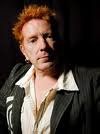
“With the Sex Pistols we were hated,
absolutely despised. There was no audience there at all to any great
extent. We sold a few records in a small banana republic called
Britain.”
– John Lydon
John Lydon -- better known as the
sneering Sex Pistols frontman Johnny Rotten -- enjoys lying. He says
as much in his rambling anecdotal and opinionated autobiography. But
he wasn’t lying when he said the Sex Pistols were hated, absolutely
despised.
Their timing was impeccable, of course.
There could be few better opportunities
to fire a snarling broadside at the monarchy in their hilarious,
angry God Save The Queen (“she ain't no human being") than
during the Queen’s Jubilee Year of 1977.
Calculated to give maximum offense, the
song spewed up out of the lower reaches of the class system and
Lydon’s Anglo-Irish resentments just as a nation was embarking on a
spending spree snapping up commemorative tea towels, trays, flags and
all the other cultural debris that such an occasion generates.
Yet it all seems so long ago.
It is 17 years since punk broke and the
Sex Pistols appeared on the Bill Grundy television show to unleash --
at Grundy’s prompting, it must be said -- a landslide of
obscenities which rocked the seismograph of popular culture and
elevated Lydon into the unenviable position of being the most hated
man in Britain.
While the other Sex Pistols took their
share of abuse (although their later drug-addled bass player Sid
Vicious was mostly too brain-fried to notice it), Lydon was the man
who stared manic-eyed out of tabloid pages and television screens.
Within days of God Save The Queen
hitting top of the British charts -- despite being banned, unplayed
and unacknowledged by radio and television -- Lydon was attacked by a
razor wielding pub crowd.
He was equally reviled by the rock
culture which spawned him. And he still feels it bitterly if his
Rotten: No Irish, No Blacks, No Dogs expletives-included
autobiography is to be believed.
Then again, he does say he enjoys
lying.
Yet we must be inclined to believe this
rambling account which is less a book than a series of tape
transcriptions.
Lydon says candidly he doesn't much
like writing -- he tried to pen this himself -- so simply sat down
with Keith and Kent Zimmerman, two Americans that nobody in the
worlds of literature or rock seems to have heard of, and said what he
wanted.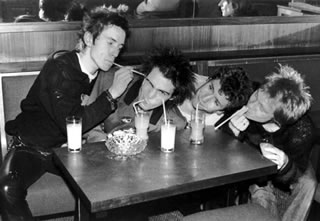
By his own account he's “writing this
book because so much rubbish has been written about us [Sex Pistols]
that it might be interesting for someone to get the correct
perspective on it and see it for what it really was."
And that sentence, delivered halfway
through this book which is also entitled grandly The Autobiography,
carries the typically sardonic, barbed attitude that infects the 340
pages.
Lydon’s account of his early life and
the Sex Pistol period, little more than 18 months in the life of this
38-year-old married California-resident, is littered with tangential
information and petty, spiteful opinion which is often colourful,
wickedly accurate when dealing to the English class system and often
unintentionally hilarious.
It takes considerable effort not to
choke with laughter at a chapter which opens, “The press reported a
ruckus at London's Heathrow Airport before our flight to Amsterdam.
Tales of vomit and drunkenness. Now what are ashtrays for but to spit
in?
“You do that, some old woman gets
offended and there’s 40 journalists there to blow it out of all
proportion. Suddenly you’ve vomited all over the airport.
“Okay, Steve did vomit at Heathrow
Airport . . .”
An intelligent reader may well suspect
that Lydon, as a professional and astute agent-provocateur in popular
culture, knows exactly what he is doing here.
The sense of outrage against the media,
the disarming sense of skewed logic (ashtrays, to spit in?) then the
delayed punchline . . . It smacks of a keen intelligence at work.
Lydon certainly possesses that.
Quite where it came from is another
matter.
There seems little in his upbringing in
the beans-on toast, bathing-in-disinfectant-every-six-weeks world
which would have set him apart.
His childhood was undeniably grim in
the poverty-ridden streets of Finsbury Park, London, where his
displaced Irish Catholic parents brought up Lydon and his three
younger brothers (one of whom we are somewhat aghast to learn is a
real tearaway, worse than the narrator). School meant truancy; food
was out of a can.
“Nobody was into healthy food back
then -- only whatever was cheap and available. Heinz fed Britain for
decades -- must be furious with this salad generation. But if Heinz
could cram salad into a can, they certainly would."
Lydon is full of such asides. “Culture
is a hokey fraud. Culture was something humans held on to because
they were afraid of demons and gods. People used it as a protection
from metaphysics. It’s sad that all culture seems to be about old
pots and corny old folk songs."
Naturally he is better when dealing
with the subject he knows, the nascent punk period in the mid-70s and
his stumbling into the band that would make his name.
Yet if he still holds particular hatred
for the British monarchy and class system he also holds personal
grudges almost two decades alter the event.
He pours poison on the Sex Pistols
first bassist Glen Matlock, the only true musician in the group and
the one who wrote most of the songs.
Lydon despises Matlock's lack of taste
(he liked the Beatles and wanted the band to be like a camp version
of the Bay City Rollers) and still wishes he would "drop dead.”
He is no less charitable towards his
school friend Sid Vicious whose real name was Simon Ritchie or John
Beverly. “Even he wasn't sure. It depended on his mothers's whim at
the time. She was just a hippie mother.”
Vicious was brought into the band to
replace Matlock despite his inability to play bass. Lydon says he
just needed an ally in the band and anyway, “he took lessons and
learned quick, actually. He wasn’t too bad at all for three-chord
songs.”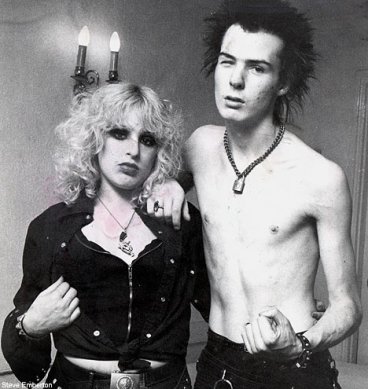
“It’s a bass guitar, for God’s
sake. Who listens to the bass guitar in a rock'n’roll band? It’s
just some kind of boom noise in the background.”
But if Lydon still fires shots at
Vicious – who died of a heroin overdose in February 1979 -- he
reserves special vitriol for Vicious’ American girlfriend Nancy
Spungen.
He says he and his friends cleaned
their fingernails with her hypodermic needles in the hope she would
“kill herself or whatever. Maybe that’s premeditated murder. I
think I did it more out of spite."
And later, Sid "disliked himself
so much he did the worst possible thing he could have ever done --
hook up with that beast, Nancy Spungen. There’s nothing vindictive
when I say she was a beast. She was a very self-destructive human
being who was determined to take as many people as possible down with
her.”
Lydon isn‘t alone in his assessment
of Spungen -- who died in ’78, Vicious being held for her murder
when he overdosed.
What ultimately salvages No Irish, No
Blacks No Dogs from being a relentless diatribe of amateur
psychology, superb one liners and score-settling is the presence of
other voices.
The co-authors interview Lydon’s
father, others on the scene at the time such as Chrissie Hynde of the
Pretenders, Billy Idol and Lydon’s schoolmates.
It gives breadth to an otherwise thin,
shallow and rambling account of one of the great musical and social
movements of recent times.
The book is little help in giving easy
answers about Lydon’s personality -- although other amateur
psychologists may identify his formative year in and out of hospital
when he contracted spinal meningitis as being pivotal.
And at least it puts that punk movement
back in the spotlight.
There are periods and aspects of rock
culture which offer themselves up for easy essays; the death of Kurt
Cobain allows pop-psychologists their go at the Grunge Generation,
Bob Dylan’s 50th birthday gives editorial writers a chance to flex
a little hip analysis.
But punk? The very confrontational
nature of its style -- in fashion and music -- has made it impossible
to assimilate into mainstream haute couture or the Rock ’n' Roll
Halt of Fame.
Lydon notes that David Bowie is “a
pompous prat” who had him thrown out of a party. Punk was such that
even the culture which allowed for it would not accept it backstage.
This was the culture of confrontation
borne of frustration, poverty that is something more grinding and
less glamorous than The Eastenders, manipulated by the band’s
manager, Malcolm McLaren, and it came just as complacency was
endemic.
In retrospect punk was purgative and in
that light it needs to be celebrated. It was also bigger than music,
more than sweeping away the Pink Floyd and Genesis clones.
Lydon’s book reminds us that punk was
about confronting angrily all that was complacent. In its own way it
was as radical as Dada before it and -- if American author Griel
Marcus is to be believed -- the French Situationalists, an avantgarde
political movement that Pistols manager McLaren saw in action during
the 68 riots in Paris.
Lydon, typically, will have none of
that academic Situationalist nonsense that Marcus intellectualised
about in his largely unreadable book Lipstick Traces about punk and
its anarchist antecedents.
According to Marcus, Lydon spits,
Michael Jackson is a Situationalist. “Forget it. There’s no
master conspiracy in anything, not even governments. Everything is
just some kind of vaguely controlled chaos.”
Punk was certainly that. And Lydon, by
virtue of innate intelligence, survived it.
Ironically the Sex Pistols broke up for
all the usual rock’n’roll reasons. There were musical differences
(although none was particularly musical all were certainly
different), girlfriends who didn’t fit in and bad drugs.
Equally ironic is Lydon's annoyance
with the complete lack of organisation on that final American tour, a
fortnight traipsing around America mostly trying to find
heroin-addicted Vicious and told with terrifying veracity in 12 Days
On the Road With The Sex Pistols by Noel Monk and Jimmy Guterman.
Lydon had had enough and when the
others lit out for Brazil and an abortive attempt at further
media-assisted outrage by meeting up with Great Train Robber Ronald
Biggs, he just called it quits. He had no money . . . but then
despite being in one of the most notorious groups rock has ever
thrown up, he never did have.
Tellingly then, his autobiography ends
with the demise of the band that created him.
However, he transcended the limitations
of being the Grand Old Man of Punk at age 21 by reinventing himself.
He reverted to his own name leaving Johnny Rotten to encyclopedia
writers and formed a new band Public Image Limited which, in a
further ironic coda, produced more anarchic and confrontational music
than the rowdy pop the Pistols ever managed.
He married and turned his sneer into a
career. And there is a wax portrait of him in Madame Tussaud’s Rock
Circus in London.
He consistently said he hated the Sex
Pistols, he'd done his bit. The maniacal stare – which he
attributes to having to focus his sight after the meningitis - lost
some of its menace or became reduced to parody.
The world moved on and punk became
another footnote in rock culture. But its effects are still felt.
Punk was a watershed for attitudes and
the do-it-yourself nature of its pervades rock culture -- and now
magazine and video language -- today.
But today Pink Floyd have topped the
charts again, the band whose T-shirt a young Johnny Rotten adapted by
scrawling the words “I hate” on and thus creating a persona, an
attitude and a brief culture called punk.
Lydon was always smart enough to
recognise the transitory nature of the world he was briefly at the
centre of. Ten years ago he could cheerfully offer; "punk
changed the business, but only temporarily. English pop music is
still about trivia and homosexuals, isn’t it?"
Lydon was always one for a smart line
like that . . . and he still is.
He opens and closes his autobiography
with the line he delivered at the end of the final Sex Pistols show
at their disastrous – and therefore typical -- show at the
Winterland in San Francisco. They are words he can use with or
without irony. But they will invariably come back to haunt him.
"Ever get the feeling you’ve
been cheated?”

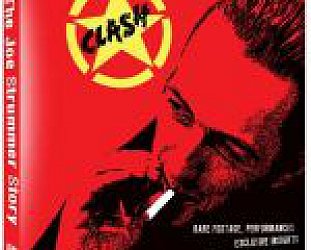
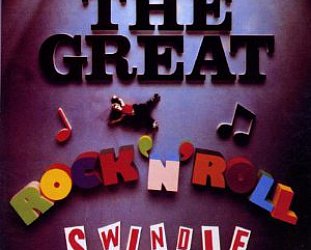
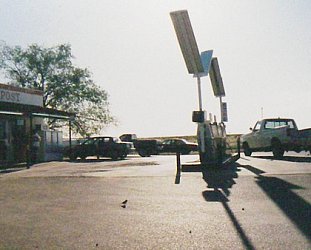
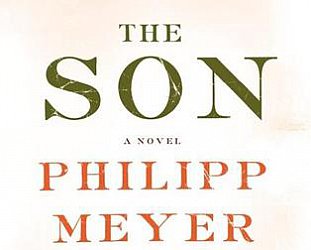
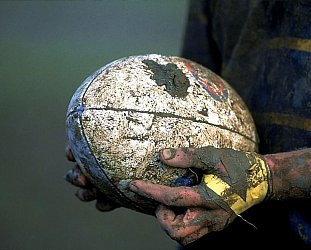
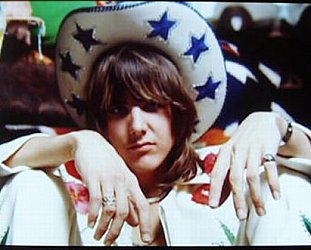
post a comment